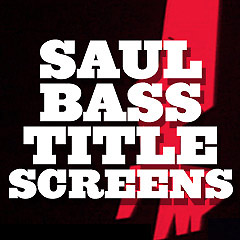
|
Movie Title Screens Saul Bass-Designed |
The famed graphic designer Saul Bass made his most lasting impact on the movies, with his designs for movie title screens. The normal and staid method for film credits was to perfunctorily present names and titles on cards, or against an unmoving backdrop. He was known as the man who invented the opening credit sequence - he incorporated the title screen into the film itself with striking images that were often animated. He transformed and elevated static title screens into stylized, moving works of art, first most dramatically with his jagged, twisted and deconstructed forearm that moved (a symbol of heroin addiction) for The Man With the Golden Arm (1955). Bass' first innovative credit sequence was for Otto Preminger's Carmen Jones (1954), using an animated flaming rose. He was able to select one emblematic, identifying image which symbolized each movie, and incorporate it into the title screen. His designer wife Nina Saxon also had more than 100 titles to her credit, while Saul Bass produced about 60 title screens (some uncredited) - with some of them co-created with her. Bass' most memorable creations were the segmented deconstructed body for Anatomy of a Murder (1959), the aerial camera swoop across Manhattan before a zoom-in on a schoolyard in West Side Story (1961), and a slinky black alley cat walking through the titles of Walk on the Wild Side (1962). His most daring innovation was a 7-minute recreation of the story of Around the World in 80 Days (1956) - an end-credit sequence. Other memorable works included his horizontal lines creations for Hitchcock's films, including North by Northwest (1959) with its facades of skyscrapers, the slashing vertical bars (symbolizing schizophrenia) for Psycho (1960), and Vertigo (1958) with its hypnotic vortex of blood-red spinning spirals, and the LED-inspired opening of Ocean's Eleven (1960). In his later years, he produced the titles for Martin Scorsese's Goodfellas (1990), Cape Fear (1991), The Age of Innocence (1993) (with blossoming rose petals) and Casino (1995) - with the striking image of the main character blasted by a car bomb through a Las Vegas Strip casino's neon into the fiery inferno of hell. Other pages with title screens include All-Time
Top Summer Blockbusters, Greatest
Film Franchises (Box-Office), Highest-Grossing
Films by Genre, Great
War Films, Greatest
Guy Movies of All-Time, and the Pixar-Disney
Animations. |
 Carmen Jones (1954) |
 The Big Knife (1955) |
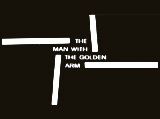 The Man With the Golden Arm (1955) |
 The Racers (1955) |
 The Seven Year Itch (1955) |
|
 The Shrike (1955) |
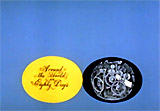 Around the World in 80 Days (1956) |
 Attack (1956) |
 Johnny Concho (1956) |
 Storm Center (1956) |
|
 Trapeze (1956) |
 Edge of the City (1957) |
 The Pride and the Passion (1957) |
 (Bernard Shaw's) Saint Joan (1957) |
 The Young Stranger (1957) |
|
 The Big Country (1958) |
 Bonjour Tristesse (1958) |
 Cowboy (1958) |
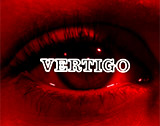 Vertigo (1958) |
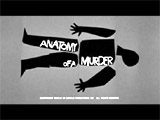 Anatomy of a Murder (1959) |
|
 North by Northwest (1959) |
|||||
 Exodus (1960) |
 The Facts of Life (1960) |
 Ocean's Eleven (1960) |
 Psycho (1960) |
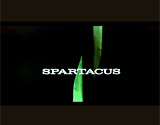 Spartacus (1960) |
|
 Something Wild (1961) |
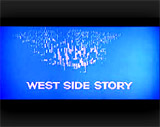 West Side Story (1961) |
 Advise & Consent (1962) |
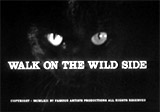 Walk on the Wild Side (1962) |
 The Cardinal (1963) |
|
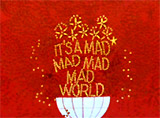 It's a Mad, Mad, Mad, Mad World (1963) |
 Nine Hours to Rama (1963) |
 The Victors (1963) |
 Bunny Lake is Missing (1965) |
 In Harm's Way (1965) |
|
 Grand Prix (1966) |
 Not With My Wife, You Don't! (1966) |
 Seconds (1966) |
|||
 Such Good Friends (1971) |
 Phase IV (1974) |
 Rosebud (1975) |
 That's Entertainment, Part II (1976) |
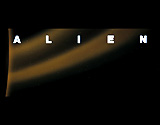 Alien (1979) |
|
 The Human Factor (1979) |
|||||
 Broadcast News (1987) |
 Big (1988) |
 The War of the Roses (1989) |
|||
 GoodFellas (1990) |
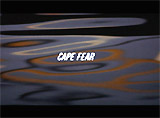 Cape Fear (1991) |
 Doc Hollywood (1991) |
 Preminger: Anatomy of a Filmmaker (1991) |
 Preminger: Anatomy of a Filmmaker (1991) |
|
 Mr. Saturday Night (1992) |
 The Age of Innocence (1993) |
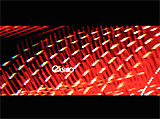 Casino (1995) |
 Higher Learning (1995) |
 A Personal Journey With Martin Scorsese Through American Movies (1995) |
|
 Psycho (1998) (same design as 1960, with different names) |
|||||